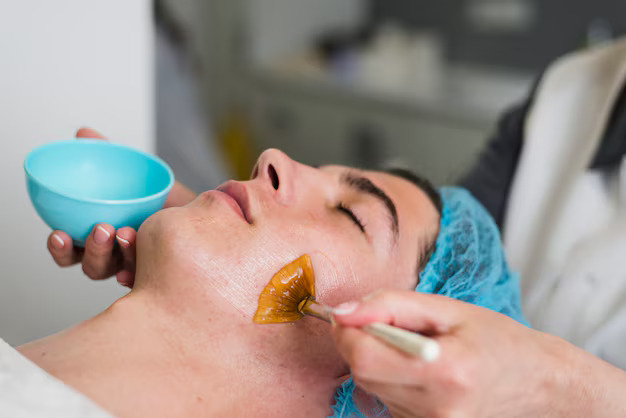Acne scars are a common aftermath of acne outbreaks. These scars, varying in size and shape, can significantly affect an individual’s self-esteem and overall skin appearance. Among the various treatments available over the counter, retinol has garnered attention for its potential to mitigate these scars. This blog post aims to explore the efficacy of retinol for acne scars, drawing on scientific studies and expert insights.
Contents
What are Acne Scars?
Acne scars result from the inflammatory process of acne and the skin’s response to it. These deep acne scars can come in various forms, including:
-
Atrophic Scars: The most widespread form of acne scars, atrophic scars, are noted for their shallow indentations in the skin, presenting a challenge to those looking to regain a smooth complexion. These scars occur due to the skin’s failure to produce sufficient fibroblasts during the healing phase, which is critical for creating collagen. The lack of collagen in the healing process makes the skin pitiful, making these scars particularly noticeable.
-
Ice Pick Scars: Characterised by their deep and narrow appearance, ice pick scars penetrate the dermis, creating an effect similar to being punctured by a sharp object. This vivid imagery underlines the severity of these scars, which are among the most challenging to address due to their significant depth. The treatment of ice pick scars often requires specialised procedures, as their profound impact on the skin’s texture makes them resistant to standard treatments.
-
Keloid and Hypertrophic Scars: Both keloid and hypertrophic scars are known for their raised nature, protruding above the skin’s surface and creating a pronounced uneven skin texture. These scars occur when there’s an excessive production of collagen as the skin heals, leading to a thick, raised area. Hypertrophic scars, while similar in appearance to keloids, differ in that they do not grow beyond the boundaries of the original wound, offering a slight advantage in terms of containment. Keloid scars, on the other hand, are more aggressive, expanding beyond the original injury site and often requiring more intensive treatment methods to manage their growth and appearance.
Understanding the type of acne scars is crucial for determining the most effective treatment method – post acne marks.

How Can Retinol Help With Acne Scars?
Retinol, a derivative of Vitamin A, offers multiple skin benefits, particularly its ability to promote cell turnover and stimulate collagen production. Its mechanisms are conducive to addressing the root causes of acne scars:
-
Stimulates collagen production: This is vital for the repair and rejuvenation of the skin. Collagen plays a key role in keeping the skin firm and youthful, which in turn helps minimise the appearance of wrinkles and fine lines. Increasing collagen production can greatly enhance the skin’s elasticity and strength.
-
Improves skin texture: This process significantly contributes to smoother and more radiant skin by promoting enhanced cell turnover. The accelerated renewal of skin cells gives the skin a healthier and more vibrant appearance, making it look fresh and revitalised. This improvement in skin texture is essential for a glowing complexion.
-
Reduces the appearance of scars: With regular usage, this treatment can gradually make scars less visible (potentially fade acne scars), thus aiding in the skin’s natural healing process. Improving the overall texture and appearance of the skin helps diminish the visibility of scars, making them blend more seamlessly with the surrounding skin. This leads to a smoother and more uniform skin surface, enhancing the skin’s overall aesthetic appeal.
How Effective is Retinol for Acne Scars?
The effectiveness of retinol in treating acne scars has been the subject of numerous studies, indicating promising results. Research suggests that retinol, by accelerating cell turnover and boosting collagen synthesis, can significantly diminish the visibility of acne scars over time.
The comprehensive study titled “Retinoic acid and glycolic acid combination in the treatment of acne scars,” authored by BS Chandrashekar and colleagues, explores the significant potential of retinol, when used in combination with glycolic acid, for the effective alleviation of acne scarring.
This research meticulously conducted a retrospective assessment on a group of 35 patients and discovered a remarkable rate of improvement; specifically, 91.4% of the cases showed significant enhancement in the appearance of acne scarring within a short span of 12 weeks. This finding highlights the efficacy of retinol in acne scar treatment and positions it as a promising solution for those seeking remediation of such skin concerns.
Furthermore, retinol’s capability extends beyond scar treatment, showing significant effectiveness in mitigating post-inflammatory hyperpigmentation. This is particularly beneficial for individuals with a darker or uneven skin tone, who may be more prone to this condition following inflammatory acne.
The study’s findings contribute valuable insights into the evolving landscape of skin treatments, offering hope and a new avenue of treatment for individuals grappling with the aesthetic and psychological impacts of acne scars and hyperpigmentation.
This study is one of many that have demonstrated the efficacy of retinol in improving acne scarring. However, it is important to note that individual results from retinol serum may vary, and patience is often required as retinol treatment can take several weeks to show visible improvements.
Potential Side Effects of Retinol

While retinol can be a powerful ally in the battle against acne scars, its use to treat acne itself is not without potential side effects. Commonly reported issues include:
-
Dryness and flakiness: Due to increased cell turnover prompted by retinol usage, the skin may exhibit signs of dryness, leading to a flaky texture. This is a common reaction as the skin adjusts to the treatment.
-
Irritation and redness: Some users might experience irritation from retinol, which can manifest as noticeable redness or a burning sensation on the skin. This is often a result of the skin’s sensitivity to the active ingredients in retinol products.
-
Increased sun sensitivity: Retinol can make the skin more susceptible to UV damage by thinning the outer layer, resulting in sensitive skin, making it imperative for users to apply sunscreen regularly to protect against sunburn and long-term sun damage.
To mitigate these side effects, consider the following tips:
-
Start with a lower concentration: Begin your retinol journey with a product with a lower percentage of retinol. This approach allows your skin to gradually build tolerance, minimising the risk of significant irritation. Over time, as your skin becomes more accustomed to the ingredient, you can opt for higher concentrations if needed.
-
Moisturise regularly: One of the common side effects of retinol is dryness. To combat this, make it a point to apply a hydrating moisturiser both in the morning and at night. This can help replenish moisture, remove dead skin cells, and protect the skin barrier, effectively counteracting the dryness often associated with retinol use.
-
Use sun protection daily: Retinol can make your skin more susceptible to damage from the sun’s ultraviolet rays. Applying a broad-spectrum sunscreen with an SPF of at least 30 daily is crucial to safeguard your skin. This step is essential, even on cloudy days, to prevent sunburn and reduce the risk of long-term sun damage.
-
Apply every other night: If you’re new to retinol, it’s wise to apply it every other night rather than every night. This less frequent application can help your skin adjust to the retinol without becoming overwhelmed, reducing the likelihood of irritation. As your skin becomes more tolerant, consider using retinol more frequently.
-
Listen to your skin: Pay close attention to how your skin responds to retinol. Listening to your skin’s cues is important if you experience persistent irritation, redness, or discomfort. In such cases, consult an aesthetic practitioner to adjust your retinol regimen or explore alternative treatments. A professional can help tailor a skincare approach to your skin’s unique needs.
By following these tips, you can enjoy the benefits of retinol while minimising potential side effects, leading to healthier, more vibrant skin.
How to Use Retinol Safely and Effectively for Acne Scars

Using retinol in your skincare routine to help with acne scarring makes a difference if you want better-looking skin. Doing it regularly and carefully can give the best results to fade acne scars and keep your skin from getting irritated. Here’s a step-by-step guide to using retinol effectively:
-
Choosing the Right Retinol Product: Select a retinol cream or serum that suits your skin type and concerns. For individuals new to retinol, products labelled “For Sensitive Skin” or those with a lower concentration (starting with 0.25% or 0.5%) are advisable. This gentler introduction can help mitigate the risk of irritation as your skin adjusts to the treatment.
-
Starting Dosage and Frequency: Initiate your retinol regimen by applying a pea-sized amount of the product to clean, dry skin two to three times a week. Retinol is best used in your nighttime routine as it can increase photosensitivity. With time, as your skin builds tolerance, you can gradually increase the frequency of application to nightly use.
-
Application Tips: After cleansing and patting your skin dry, wait a few minutes to apply retinol. This allows your skin to return to its natural pH levels, reducing the likelihood of irritation. Apply the retinol evenly across your face, avoiding the delicate eye area where the skin is thinner and more prone to sensitivity.
-
Importance of Sun Protection: When incorporating retinol into your skincare routine, daily application of a high-SPF sunscreen becomes non-negotiable. Retinol thins the outer layer of the skin, making it more susceptible to UV damage. Apply a broad-spectrum sunscreen with an SPF of 30 or higher every morning, reapplying as necessary throughout the day, especially if you spend extended periods outdoors.
-
Moisturise Adequately: Given retinol’s propensity to cause dryness, integrating a hydrating moisturiser into your morning and evening routines can provide essential moisture, reinforcing your skin barrier. Opt for fragrance-free, non-comedogenic formulations that hydrate without clogging pores.
-
Monitor Your Skin’s Reaction: Consider how your skin responds to retinol, especially within the first few weeks. If you observe excessive dryness, flaking, or irritation, consider reducing the frequency of retinol application and consult with an aesthetic practitioner if necessary.
-
Patience is Key: Remember, changes in the appearance of acne scarring with retinol serum use won’t happen overnight. Consistent application coupled with patience is crucial. It may take several months of regular use before noticing significant improvements in acne scars.
Incorporating retinol into your regimen for acne scars requires patience and persistence. For personalised advice, consult an aesthetic practitioner who can provide tailored recommendations suited to your specific skin needs.
Conclusion
Retinol has demonstrated efficacy in treating acne scars, making it a valued component of skincare regimens aimed at scar mitigation. However, its effectiveness is contingent upon proper use, patient skin type, and the severity of scarring. For those contemplating retinol for acne scars, it is important to begin with a comprehensive understanding of the product and to seek guidance from an aesthetic practitioner, such as Dr. Justin Boey from Sozo Aesthetic Clinic.
Considering the evolving landscape of skincare and treatment modalities, the continuous exploration of retinol and other treatments remains crucial in pursuing optimal skin tone, health and appearance.





